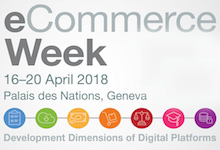Africa and the e-commerce potential
19 Apr 2018 13:15h - 14:45h
Event report
[Read more session reports from the UNCTAD E-Commerce Week 2018]
This session was moderated by Mr Dylan Piatti (Consumer and Retail Chief of Staff, Deloitte Africa; Chairman of the Board, E-commerce Forum Africa (EFA)). He introduced the EFA by explaining its role in enriching digital trade in Africa by bridging partnerships through investors and governments.
Bertrand Assamoi (Lead, Business Engagement, Africa, at the World Economic Forum (WEF)) said e-commerce connects the world while addressing social and economic issues. It is becoming a greater part of a country’s Gross Domestic Product (GDP), and therefore should be seen as a way to help countries grow by reaching out to small and medium enterprises (SMEs) and micro-businesses. E-commerce provides opportunities for greater access to markets for SMEs, enabling inclusive growth. He addressed the issue of high rates of unemployment among African youth as a risk, but also an opportunity for the continent to embrace the opportunities offered by digitalisation. He listed slow rural development and poverty as hindrances to e-commerce growth. To address the serious challenges faces in Africa, WEF is launching initiatives such as Enabling E-commerce, bringing together the most influential players from the private sector, government, and international organisations. Together, these groups could identify key roadblocks so that African countries can stay on track with the policies they need to enact to address issues efficiently.
Mr Leonard Stiegeler (General Manager, Ringier Africa) explained his company’s new strategic involvement in Africa. They develop media interfaces for marketplaces to run classified platforms, for example find a job, list a job, sell something. Ringier partners with smaller businesses on the continent and hosts them jointly on their infrastructure. Stiegeler said that in the past six years there has been an explosion of mobile Internet use in Africa. There is increasing interest within the continent from corporations to go digital in terms of payments, marketing, and business. He commented on the 200 million dollars in investments overall last year, which is marginal in comparison to other start-ups around the world. Ringier hopes to bridge the gap between investor interest and digital knowledge in the region. He stated that the biggest cost factor in the process is educating SMEs on how to use their e-commerce platforms.
Mr Chris Folayan (Founder, Mall for Africa and Mall for the World) described his company’s relationship with US and UK retailers and how this increases trust when bringing e-commerce to the continent. He said the western world underestimates how much Africans desire brands, tools, and technology. Folayan stated that his company connects the two parties so they have greater access. He underlined their desire not only to import products, but also to help local artisans sell internationally. The solution was a partnership with eBay to advertise the local goods. This digital integration improves the local economy and equips generations to come so they feel encouraged to contribute to the global market. He said that verifying product quality is a major obstacle among African business owners trying to sell abroad. Africa Made Product Standards (AMPS) is a standard designed to help bring these quality standards across the continent under one umbrella to gain consumer confidence abroad.
Mr Alastair Tempest (Chief Executive Officer, EFA) spoke about how e-commerce’s further development potential currently lies with developing countries and youth, and that recent digital penetration in Africa is a testament to that. He said that solutions to development and job creation come from e-commerce. He restated Stiegeler’s point, that lack of skills and digital awareness are major obstacles in the region that must be overcome to continue progressing. He emphasised the need for continent-wide digital education. He mentioned the beginnings of a contract for a continental free trade area (CTFA) in Africa to bolster economic activity in the region. He suggested that digital currency may be a solution to move past the red tape in trade between African countries.
Piatti ended by asking the panellists what the government and private sector must do to help e-commerce grow. Stiegeler said governments must advertise their markets to investors, and also, partner with organisations to get citizens to be digitally proficient and become competitive in the market. Tempest suggested that the public and private sectors work together to gather local data on e-commerce to clarify the next steps. Folayan stated that the Internet’s footprint must increase in Africa. Lastly, Assamoi underlined the need for governments to invest in infrastructure to increase electricity and Internet access.
By Isabel Ashley
Related topics
Related event

